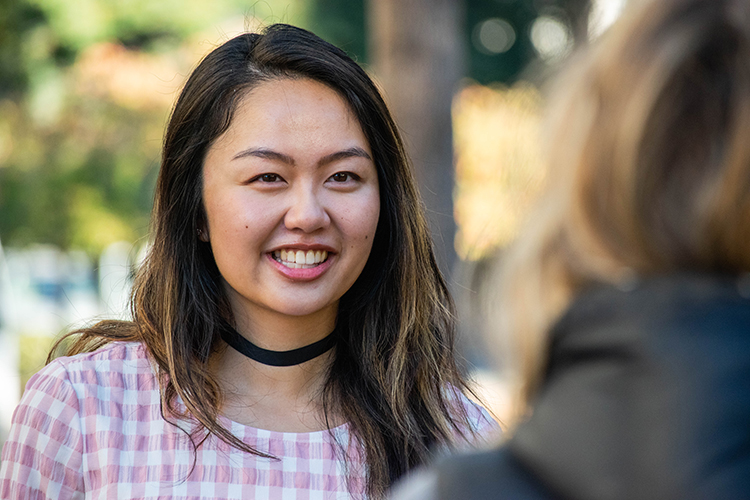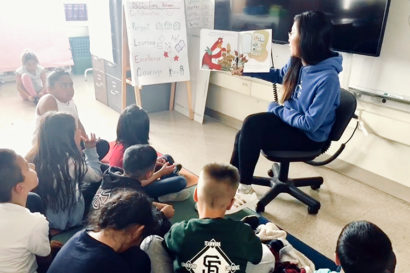I’m a Berkeleyan: Tiffany Yu on her fight for basic needs, using data in health
"Whether we like it or not, technology is our future, and I believe we can look at what’s already been done in certain spaces with technology and bring that to basic needs," says the third-year public health and data science student
October 29, 2019

Tiffany Yu is a third-year student in public health and data science. (UC Berkeley photo by Irene Yi)
“During the summer between my freshman and sophomore years at UC Berkeley, I was a teacher for a summer program called the Big Lift. It’s designed to bridge the achievement gap between students who have the means and opportunities to continue their education over the summer and those who do not. Research has shown that children who continue learning over the summer have dramatically improved academic performances when they go back to school in the fall compared to students who don’t continue learning.
The program was for children in kindergarten through second grade. I taught a second grade class. I remember that there were some students who, during lunchtime, after they ate their meal that we provided to them, would ask me for more food. In the beginning, I didn’t think much of it, and I would just get them another plate of food.

Yu reads to second-graders during the Big Lift, a summer program designed to bridge the gap between low-income students and students who had opportunities to continue their education over the summer. (Photo courtesy of Tiffany Yu)
But over the course of several weeks, I started to notice a pattern: It would always be the same students asking me for more food. And I started to recognize a correlation between the students who would ask for more food and the ones who had most difficulty paying attention in class, the ones who tended to act out more. To me, this was not a coincidence.
It was very eye-opening for me because it showed the strong relationship between access to food, access to basic necessities, and your performance and success. Those children inspired me to continue that fight here at Cal as a public health and data science double major.
I’m the director of basic needs in the ASUC Office of the President. Food insecurity is an issue people don’t openly discuss, which is ridiculous because it affects so many students on campus. Forty percent of undergraduates on campus are food insecure. Food insecurity doesn’t just mean that you can’t afford food. It also means not having access to healthy, nutritious food. Or not being able to take the time out of your day to go get food because it’s geographically difficult to get to a supermarket.
I also co-teach a DeCal course with three other students on campus called Health Policy and Advocacy 101. We were all part of a student group on campus called the Cal Undergraduate Public Health Coalition.
In the class, we teach students about the Affordable Care Act, Medicare, Medicaid, health insurance terms — because we know that once we graduate, that’s going to be a new reality for us to face. We also cover health policy topics, like reproductive health, LGBTQ health, vaccinations, and mental health. In our last class, we’re going to be analyzing the proposed health platforms of all the 2020 presidential candidates.

From left: Yu with students Ovya Ganesan, Lindy Liu and Nina Leviten, who facilitate the DeCal course, Health Policy and Advocacy 101. (Photo courtesy of Tiffany Yu)
We wanted to make sure that this class was user-friendly for people who had no prior experience taking a public health class or didn’t know anything about health insurance and health care. Because the American healthcare system is very complicated, we teach what we feel is most important for students to understand.
For my work with the ASUC, I lead the first partnership between the Office of the President and Cal Hacks, the premier hackathon on campus. It’s one of the largest hackathons on the West Coast. My team and I developed an instructional manual on how to build technology in the basic needs space. This starter pack was designed as a tool for programmers to use to better understand the unique challenges in basic needs, and how to build technology that is accessible and usable by the demographic impacted the most by basic needs insecurity.
Whether we like it or not, technology is our future, and I believe we can look at what’s already been done in certain spaces with technology and bring that to basic needs.

Berkeley students sign up for help at the campus’s Basic Needs Center, which helps young people facing poverty. (UC Berkeley photo by Megan Lee)
An observation I have made about Cal Fresh, a food assistance program in California, is that there are Berkeley students who qualify for this free program, but are not enrolled in it. We have services on campus, like the Basic Needs Center and Cal Fresh at UC Berkeley, that help students navigate the application process. Even so, this process can still be quite difficult and confusing for many students. I believe there is an opportunity for technology to streamline the process and simplify it, perhaps in the form of a chatbot, mobile app or interactive video. Rather than replacing these invaluable basic needs resources that exist on campus, technology can help enhance these services and broaden its reach within the community.
An organization I am part of on campus that bridges my passion for technology and health is the Fung Fellowship, an undergraduate program designed to develop solutions that address wellness and health disparities. As a Fung Fellow, I have worked on projects ranging from enhancing community engagement in geographically dispersed freshman dorms, supporting adolescents in identifying unhealthy online social interactions and strengthening social connectivity in college students. I recognize that technology should not be the go-to solution for every social issue, but I do believe there is value in incorporating concepts in design and product development in our approaches towards ongoing challenges.
After I graduate, I want to go into the digital health field. I’m so passionate about using data, technology and digital media as a force for social good, especially in the field of health. And right now, we are at a place where we’re going to see more of an intersection between health and technology than ever before. The education, knowledge, mentors, friends and skills I have gained at Berkeley will not only enable me to contribute to this dynamic new field; it will allow me to lead it.”